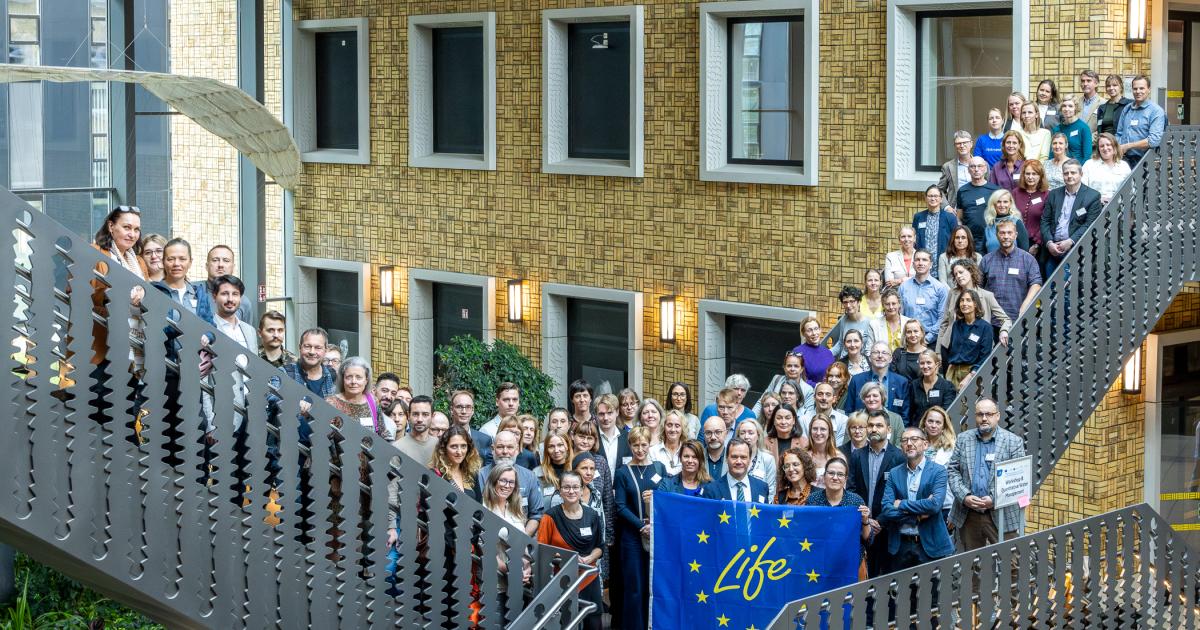The LIFE Platform Meeting Focus on Water Resilience Strategy — organised by CINEA and co-hosted by LIFE BELINI and the Flanders Environment Agency — brought together more than 100 experts, project leaders and other stakeholders from 39 LIFE projects covering 21 countries concerned with water scarcity, climate change impacts and deteriorating water quality.
‘We are not managing water as we should,’ Claudia Olazabal, Head of the Sustainable Freshwater Management Unit at DG Environment, said in her introduction to the meeting. ‘Crises and more extreme events are coming our way. The water resilience agenda is now high on the European agenda.’
Aimed mainly at project managers and officers working on LIFE strategic integrated projects (SIPs) and at policy-makers working on river basin management plans (RBMPs), the 2-day event also attracted representatives from other LIFE projects focused on river restoration and water management in specific locations.
Participants took a deep dive into issues ranging from pollution and biodiversity loss to nature-based solutions (NBS), water management and innovative financing — all aimed at improving the poor state of many European surface water bodies. Field visits hosted by LIFE BELINI provided an opportunity to see strategic river management in action, including a boat trip on the historic waterways of the River Scheldt and a tour of Aquiris, Belgium’s largest wastewater treatment plant.
With only 39.5% of EU surface water bodies achieving ‘good’ ecological status, and 26.8% only rated ‘good’ for chemical status, LIFE projects are on the frontline, developing and implementing solutions. ‘Significant work is needed to meet EU targets on freshwater quality and quantity. The average health of EU surface water bodies is critical,’ added Anders Iversen from the Sustainable Freshwater Management Unit at DG Environment.
First day thematic workshops on pollution control (featuring LIFE NARMENA and LIFE POPWAT); qualitative water management (RBMP LIFE-Malta and LIFE EBRO Resilience); and NBS (LIFE Living Rivers and Improve Aquatic LIFE) focused on challenges. On the second day, solutions-orientated workshops looked at finance (LIFE SIP Vanduo and LIFE BELINI); governance (Living River Lahn and LIFE CLIMAX PO); and digitalisation-innovation (LIFE Pilica and LIFE GoodWater IP).
LIFE SIPs — multi-level, multi-sector projects spanning different countries and regions — were praised for their ability to mobilise complementary funding, stimulate innovation, encourage cross-border cooperation and push authorities towards more ambitious water management goals. They play a significant role in river basin management plans, such as that for the River Danube, underlining the need for strong cooperation among EU Member States to ensure effective water management.
Other projects taking part in the LIFE Platform Meeting included LIFE CleanEST, LIFE SIP WET-EST, LIFE IRIS AUSTRIA, LIFE CONNECTS and LIFE RICH WATERS. For a full list of participants, agenda and presentations, please visit the event website.
LIFE SIPs and other projects working on water resilience support the European Water Resilience Strategy, #WaterWiseEU campaign, the Nature Restoration Regulation, Biodiversity Strategy 2030, and the EU Directives on water, urban waste water, drinking water, marine strategy, habitats and birds. They also support the goals of the European Green Deal and the long-term climate strategy.

